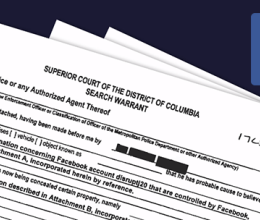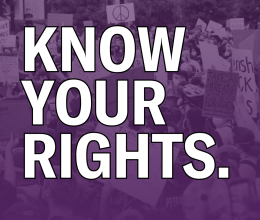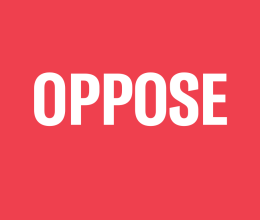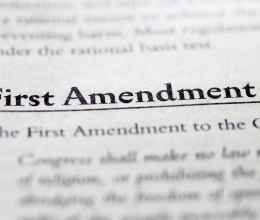
Following the mass arrests the government carried out on Inauguration Day 2017 (which we challenged in Horse v. D.C.), the government obtained search warrants for the disruptj20 Facebook page and the personal Facebook accounts of political activists Lacy MacAuley and Legba Carrefour. Although the warrants were ostensibly directed at investigating what the government alleged was a “riot” on Inauguration Day, in fact the warrants required Facebook to disclose the entire contents of these accounts for a period of more than 90 days. Among the material required to be disclosed to the government were all private messages, friend lists, status updates, comments, photos, video, and other private information solely intended for the users’ Facebook friends and family, even if they had nothing to do with Inauguration Day. The warrants also sought information about actions taken on Facebook, including all searches performed by the users, groups or networks joined, and all “data and information that has been deleted by the user.”
The enforcement of these warrants would reach deeply into individuals’ private lives and protected associational and political activity. Government agents would gain access to the Facebook users’ communications with friends and family, names and pictures of family members including children, personal passwords, security questions, home addresses, credit card information, intimate messages shared with a romantic partner, medical information including prescription-drug information and psychiatric history and treatment, and discussions of individuals’ experiences with domestic violence. Government agents would discover a detailed portrait of individuals’ political activities and associations, including their political views and commentary; the pictures and names of individuals who participated in or organized political demonstrations, rallies, dance parties, teach-ins, and other political events; messages reflecting a user’s involvement or affiliation with specific political organizations or groups; and political or organizational strategies for political activism – all regarding events unconnected to January 20. The identities of thousands of Facebook users who “liked” the disruptj20 Facebook page, and non-public lists of intended attendees of events associated with the disruptj20 page — including events, such as a peaceful dance-party protest to call attention to the anti-LGBT stance of the incoming Vice President, that are in no way associated with any alleged “riot” on January 20 — would be revealed to the government as well.
Originally, Facebook was under a gag order not to disclose the existence of the warrants. With the ACLU-DC’s support as amicus, Facebook challenged the order, and the government dropped the gag order in September 2017 right before the D.C. Court of Appeals was to hear the case. Facebook then promptly notified MacAuley, Carrefour, and disruptj20 Facebook page administrator Emmelia Talarico that their accounts were at risk.
Two weeks later, on behalf of the owners of the three accounts targeted, we filed motions in D.C. Superior Court to intervene and to quash the warrants as overbroad under the Fourth Amendment because they would invite extensive invasions of privacy and chill First Amendment-protected political speech and association by subjecting anti-administration political activists to wide-ranging scrutiny by the very administration they were protesting. The court heard oral argument on October 13, 2017.
On November 9, the court imposed significant limitations on the warrants: The court required Facebook to edit out all third-party identifying information, including the identities of the approximately 6,000 people who liked or followed the DisruptJ20 Facebook page, the names of MacAuley and Carrefour’s Facebook friends, and the names of anyone who communicated with MacAuley or Carrefour. In addition, the court limited the date range of photos sought from all three accounts. The court will also require the government to submit a search protocol to the court for approval before it can search the DisruptJ20 page. The court also ordered the government not to share or retain any material it cannot prove probable cause to “seize” for its investigation. However, the court did not protect MacAuley’s and Carrefour’s private content from government review. The court rejected the ACLU-DC’s suggestions that it appoint a neutral third party to review the material and prevent the government from receiving information irrelevant to its investigation, or that the government be required to use a court-approved search protocol for the personal accounts. The court also denied the account holders’ request to intervene formally.
On November 16, the ACLU-DC sought reconsideration of the court’s denial of intervention and its decision not to require a Court-approved search protocol for MacAuley’s and Carrefour’s Facebook account.
In July 2018, the government dropped the last of the criminal charges against protestors for their Inauguration-Day conduct; accordingly, the warrants we challenged became moot, and MacAuley’s and Carrefour’s personal information was never disclosed.




